Coldest Hunts: Harrowing Tales of Waterfowling
Tales of hunts at the bitter end of the season
Tales of hunts at the bitter end of the season

From the Ducks Unlimited magazine Archives
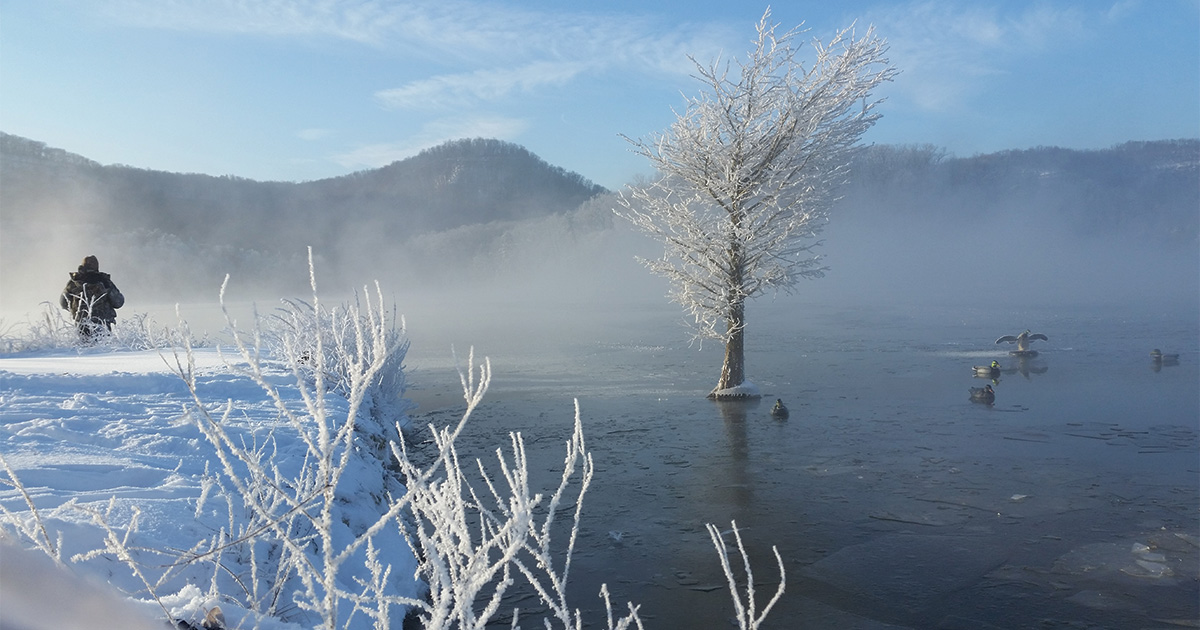
In many ways, waterfowl hunting is defined by cold weather. Snowstorms and Arctic fronts often trigger grand passages of ducks and geese, providing phenomenal shooting for hunters lucky enough to occupy a blind in the flight path. Severe cold snaps also benefit hunters by concentrating birds on remaining open water, and even the wariest ducks and geese will respond to decoys and calling during a gale or a blizzard.
But wintry weather presents many challenges for waterfowl hunters. Freezing temperatures can wreak havoc on outboard motors, shotgun actions, calls, and decoys—not to mention fingers and toes. And high winds, ice, and snow can make driving and boating treacherous for even the most experienced and well-equipped waterfowlers. Indeed, it's the battle against the elements and the cold that sets the sport apart from more mundane pastimes.
As winter sets in across much of North America, Ducks Unlimited asked four veteran waterfowlers—Wade Bourne, Doug Larsen, David Maass, and Marc Pierce—to describe their most memorable cold weather hunts. Here are their stories.
One of my best late-season hunts took place in the early 1980s—back when we still had some cold weather. The temperature had fallen into the single digits, and six inches of snow lay on the ground. All the shallow water had frozen, and the only open water around was the Cumberland River channel on Lake Barkley in Tennessee. Two good friends of mine, Don Brock and Phil Sumner, decided to run the river channel and try to locate some ducks. We couldn't find a boat ramp that wasn't socked in with ice, so we drove our truck in four-wheel drive out on a gravel bar that extended into the river channel and launched the boat.
It was a clear day with almost no wind, and everything was white with snow except the ribbon of water in the channel. We ran for several miles, jumped a few ducks, but didn't see anything that made us want to stop. Then we saw a flight of ducks fall in behind an island where a creek joined the main river channel. The mouth of the creek was frozen, but those ducks fell in as if there were open water somewhere. So we beached the boat on the island and decided to do a little scouting.
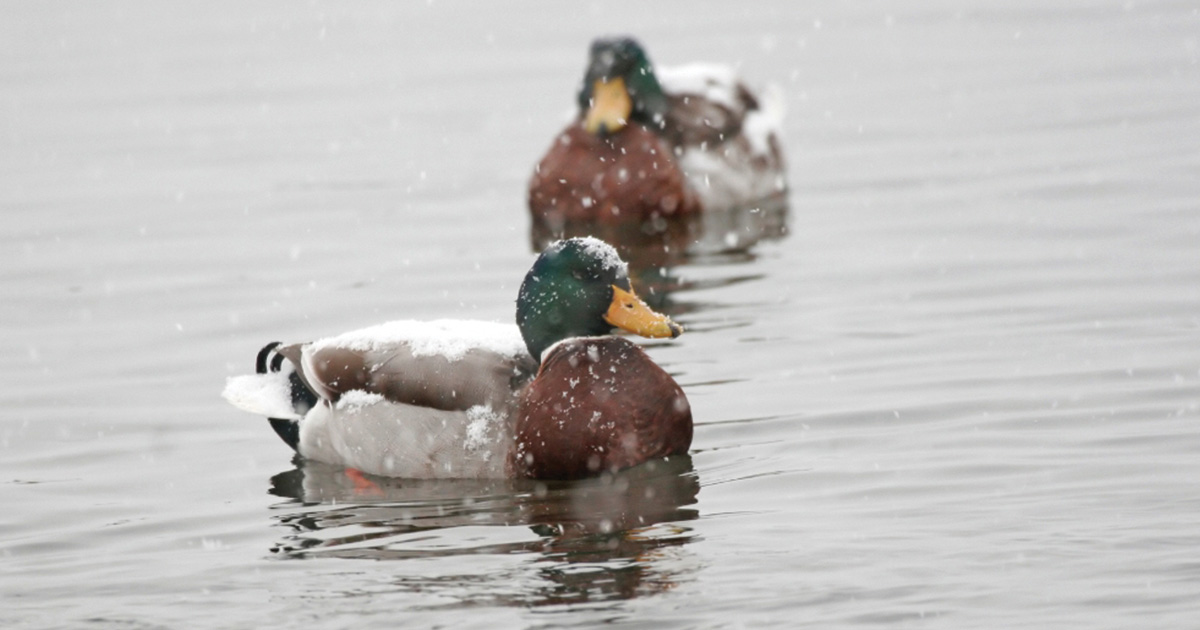
All our decoys had frozen together in the bottom of the boat, but we managed to rattle several of them loose from the pile. We also had some white bedsheets with us so that if we found a place to set up, we could make a blind that would blend with the snowy background. We took the white sheets and decoys with us and struck out across the island. When we slipped through the screen of buckbrush on the other side, about 200 ducks flushed out of a hole in a frozen slough. Evidently, a spring bubbled up there and had kept the water open. It was just a little patch of water-probably no more than 5 yards by 10 yards—but it was jammed with ducks.
The water was only about three feet deep, and it was no problem for us to walk out and set decoys in the hole. Since there wasn't enough cover to build a blind, we simply lay down on top of the snow and pulled the white sheets up to our noses. In just a few minutes, ducks started coming back in ones, twos, and threes, and we shot limits of mallards and black ducks in about an hour.
We had worked up quite a sweat walking across the island in our heavy clothes, and we got chilled to the bone lying in the snow. I'll never forget the sight of Don's beard covered with frost from the condensation in his breath freezing. He looked just like Dr. Zhivago. Along with Phil, he's one of my dearest friends and best hunting partners, and that's a memory I will always cherish.
Growing up in Minnesota, I have a lot of experience with cold weather, but one particular duck hunt has stuck with me. The hunt took place back in the early 1980s. I was living in Minneapolis with my brother, Chris, who was in college at the time. The temperature was in the mid-teens, and the wind was blowing out of the northwest at more than 30 miles an hour—a perfect flight day for ducks.
When we reached the large pothole that we intended to hunt, we heard waves lashing on the surface over the roar of the wind. By shooting time, several of our decoys had tipped over, already weighed down by ice forming on them as the waves wet their surface. We didn't have neoprene, fleece, or Gore-Tex back then, and our clothing was simply no match for the weather that day.
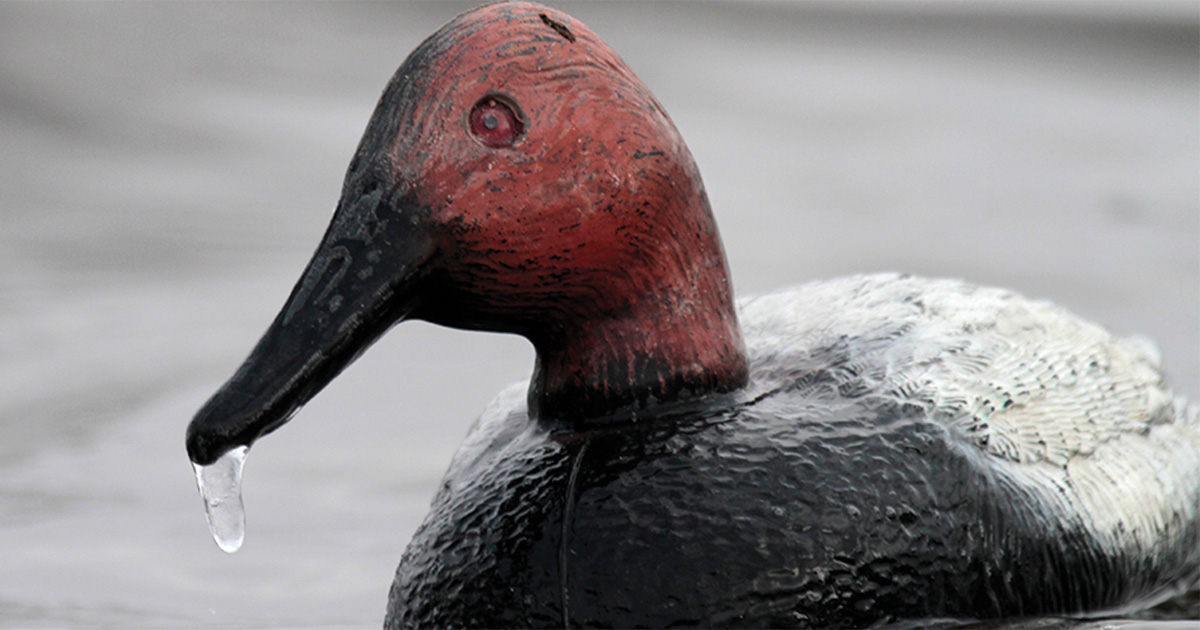
Nothing flew until about eight o'clock, and by then we were so stiff with cold, we could barely shoot. By 9:30, our situation had become critical. Chris could not feel any of his fingers, and their numbness was starting to cause him real discomfort. I knew one of my feet was frostbitten, or close to it. I could tell my ears were frozen too. We decided that to stay any longer was foolhardy.
Struggling against the wind and waves, we had to cut the strings of our ice-covered decoys to get them in. The boat was sitting low in the water, the weight of the ice pulling it down. When we reached the shore, Chris jumped out of the boat and ran to the truck. Minutes later, I piled into the cab and pressed my bare hands onto the warm dashboard. Chris had been there long enough that his frozen hands had started to slowly come to life, and the pain of the thawing process was excruciating for him. My ears burned, but I knew this was nothing like the savage pain Chris was feeling as his numb hands, every nerve coming to life at once, slowly warmed from the inside out. Chris cried out and cursed, and I saw tears roll down his cheeks. I got out of the truck, and as a blast of wind slammed the door closed, it drowned out his cries. We still talk about that hunt to this day. I've been extremely cautious about hunting in bitter cold weather ever since.
I'll never forget my first hunt with Arnold Krueger, whom I have hunted with now for more than 40 years. The hunt took place back in the early 1960s when I was living in Owatonna, Minnesota. It was late November, and for me duck season was over. All the places that I normally hunted were frozen, and I had already put away most of my hunting stuff. On a Friday evening, I went into a liquor store for some supplies, and I bumped into Arnold. He was wearing his duck hunting clothes, so I went up to him and asked him what he was up to. He told me that he had found a spot where there were some ducks. Then he asked me if I wanted to go hunt with him in the morning. I had never hunted with him before, but I figured if he knew where there were some ducks, it would be great to get in one last hunt of the season.
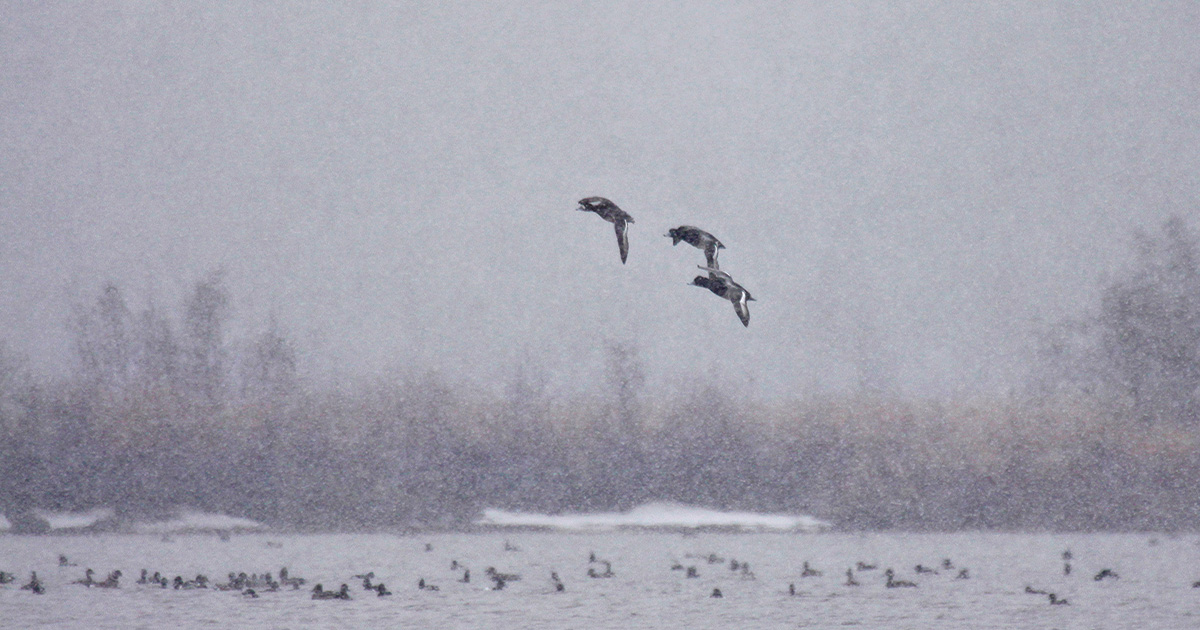
The next morning, Arnold took me to a large lake west of town. It was about 12 degrees with a stiff wind. He had an aluminum canoe that we hauled with us on the ice toward the open water out in the main lake. I was a little concerned because I wasn't familiar with the area and couldn't see a thing in the dark. Arnold assured me there was nothing to worry about. Just then, I went through the ice and got one leg very wet. As cold as it was, we had no choice but to go back to the truck, where Arnold thought he had some dry clothes. All he had was some socks behind the seat. But I was young and eager to get some ducks, so I changed my socks and went right back out there, even though my pant leg was still pretty wet.
We crossed the ice a second time, and when we got close to the open water, we started breaking through again. Fortunately, this time the water was shallower, and we stayed dry. In the end, it was worth everything we went through to get out there. Soon after we set up, the bluebills came in droves. There were so many birds that we completely forgot about the cold.
Both of us were shooting Browning A-5 humpbacks that had a tendency to freeze up in very cold weather. To keep our guns working, Arnold lit a kerosene heater in the canoe. We stood by the boat and held our shotguns by the heater until it was time to shoot. After we got our birds—which didn't take long—we stayed out there for a long while, just watching the ducks and taking pictures. I don't think either of us has ever seen so many bluebills in one place. The best part was from then on, Arnold and I became good friends and hunting partners.
I have hunted the same warm-water spring creek in Montana for about 25 years. When the ponds in our valley freeze and the rivers get slushy with ice, all the mallards that haven't migrated congregate on the open spring water. We built a blind by the creek years ago and found that it offers excellent hunting, especially when it gets really cold.
I told my old friends in the Midwest about how good this spot was, and how they needed to come out to Montana and hunt it with me. One day, three of my buddies were passing through the area, and we made plans to hunt together at my blind on the creek. As luck would have it, this unbelievable Arctic cold front came through, and the temperature dropped to 20 below zero the night before our hunt. Now a couple of people, most notably my father, had suggested that we put a heater in the blind for just such occasions. And I always said, "Naw, heaters are for wimps; we're duck hunters."
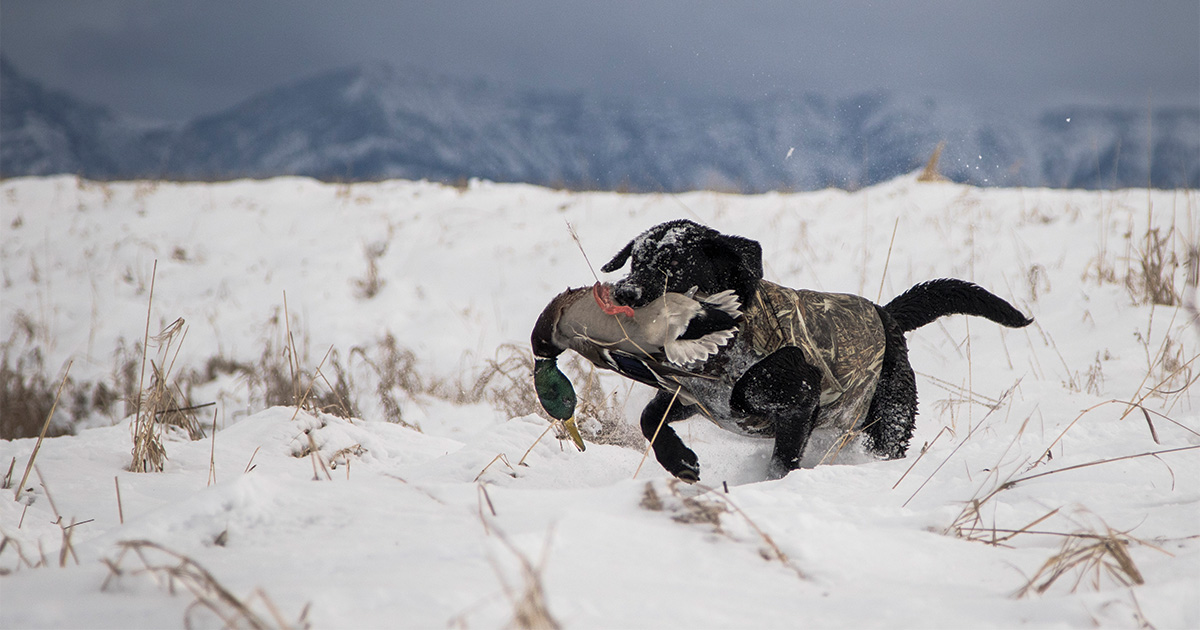
The next morning when we went out to hunt, I parked the truck about 100 yards from the blind and left the engine running with the heater on full blast. Our plan was to hunt in two groups. Two of us went out and hunted in the blind for as long as we could possibly stand it, which was only about 20 to 30 minutes, before running back to the truck to thaw out. Then the second team went out for another 20 minutes or so before switching places again in the truck.
We also had two retrievers, and we rotated them in shifts as well. The dogs came back each time completely coated in ice. And when they jumped in the warm truck, steam and water just poured off their bodies. We had to constantly rub the condensation off the windows to see what the other guys were doing. But we made the hunt work, and we got our limits of greenheads.
And the very next year, I heeded my father's advice and put a heater in the blind.
Ducks Unlimited uses cookies to enhance your browsing experience, optimize site functionality, analyze traffic, and deliver personalized advertising through third parties. By continuing to use this site, you agree to our use of cookies. View Privacy Policy